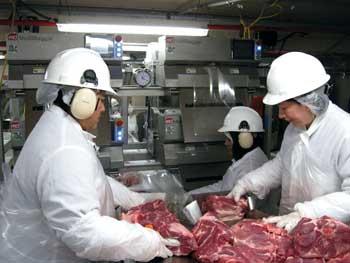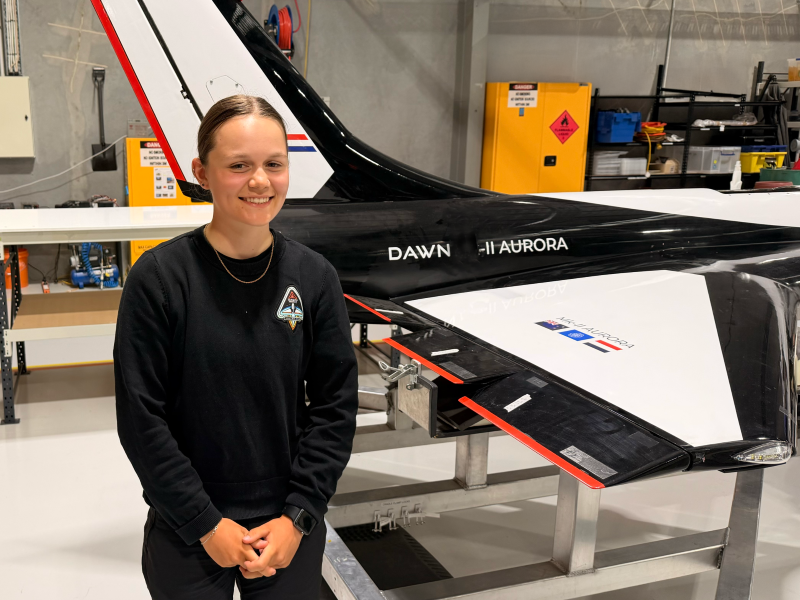|
Kiwi ingenuity is changing the way the meat packaging industry in the US operates, with a unique, cost saving, and patented bag making machine. Jenny Baker reports.
Auckland companies Systems Controls Limited (SCL) and Machinery Developments (MD) have a confirmed order book to place at least 100 of their new MultiBagger Series 9 machines into work with a number of United States meat packaging giants this year.
The machine uses unique and multiple patented processes to produce vacuum shrink bags from rolls of plastic bag tubing in real time in a primal cut meat processing line.
The MultiBagger Series 9 makes bags from rolls of blank bag tubing, which reduces plastic material wastage and cost. In addition, it incorporates a thermal transfer printer that prints information collated during the primal cut manufacturing process directly onto the bag. The information can be regular and variable values – such as country of origin labels, grades, logos, ME numbers, and the date and time of packaging. This ensures each prime cut is uniquely identifiable and traceable.
SCL is machine builder MD’s design and technology partner. SCL carried out the electrical, software, and mechanical development on the product. SCL is also a shareholder in MD and handles sales and distribution of the MultiBagger Series 9 in New Zealand and Australia.
The two companies refined the MultiBagger Series 9 from earlier versions built by Machinery Developments. SCL director Chris Chandler says a combined SCL-MD team arrived at ingenious home grown solutions to tough challenges through trial and error over a two and a half year period. “Our competition is bags out of boxes. The machine will change the way protein producers package their product....the sheer payback the Series 9 brings will drive it.
“It offers meat producers many advantages, which together make it possible to create payback on the initial capital investment in the technology in as short a period as three months,” he says. He adds, with the Series 9, traceability costs the meat producer nothing: “It’s a standard and bonus feature of a system that substantially reduces packaging and operating costs.”
MD director Alex Melville explains the benefits to meat producers of using the system and the challenges the teams faced to bring the Series 9 to productability. MD is a family owned business that grew to a machine developer for the meat industry in 1986 after owning lamb processing plants: “Our main challenge was to create an inline bag with the same or better integrity than the bags that come in boxes.
“In their time as meat processors the Melvilles had come across every problem meat producers can possibly have. We’ve experienced the challenges first hand. In the late 80s we got sick of the high costs of packaging and developed a bagging machine. The Series 9 is the legacy product of that,” he says.
SCL also has a long and successful history in the meat processing industry. “This put us in a good position to work together to develop the ideal product, as both companies knew exactly what was required for this product to do a perfect job. The new model benefits from two sets of expertise; it is faster, simpler, more reliable, and more scalable.
“During our collusion we decided to operate as one company – SCL focusing on technology, continued development, and manufacturing, and MD focusing on sales and marketing,” says Melville.
Reduced packaging costs and waste
Melville describes the machine as a significant cost saver. In a typical US pork operation, it enables a head count reduction of close on five percent of the labour complement and associated operating costs. The MultiBagger Series 9 has the proven capability to reduce packaging costs by up to 30 percent and packaging waste by up to 20 percent. It benefits logistics and inventory by reducing the number of vacuum bag stock items by up to 95 percent.
Simple to load and operate, the MultiBagger is a true ‘out of the box’ product that can create and print bags of any width up to 18 inches and produce and print up to 30 bags per minute. Operators use a touchscreen to choose from pre-programmed options including bag length and print. The machine uses the latest automation hardware and servo motors and is totally PLC controlled. IP67 housing protects the electronic components, and the machine is of a high quality stainless steel construction.
Chandler says they will soon be offering the MD CutSizer option as an extra addition to the Series 9. This function will measure the length and width of each cut and communicate with the MultiBagger to create a perfect custom sized bag. This is proven to reduce plastic consumption by a further 20 percent compared with finished bags out of boxes.
“The CutSizer can form the basis for scalability to additional functionality including cut identification, automatic weight ranging, automated rear pack-off, and automated order fulfilment. We’re also looking at robotic applications to fill the bags, which will further simplify and automate meat processing,” he says.
Chandler and Melville agree developing the machine was costly and time consuming, but the companies made the best of a unique opportunity: refining its operation by observing it in service at their first Series 9 customer, US-based Smithfield Pork. Comments Melville: “With SCL as design partner and a plan on the drawing board we went to the US around two years ago to explore the market. During the run-in period the SCL-MD team members spent significant time on site in the US, observing and upgrading the MultiBagger as required.
|
“We won Smithfield Pork early on, as the machine’s advantages and capabilities were obvious, even on paper. The company took initial deployment of a machine about a year ago. During this time we partnered with them to upgrade the machine as a work in progress.
“The customer put it through its paces in a manner we could never have achieved in a workshop environment. We also did the home run development with four Series 9s in full work on their floor. For us to torture test at this level would have cost millions in packaging costs alone. So this was a fantastic opportunity that had only an upside for us and the customer, who started reaping the benefits from the first day. And we know for a fact the machine is tough and reliable,” says Melville.
Kiwis can do
The longevity and strength of the cutting blades, heat sealing system, and static were time consuming and expensive challenges the team had to overcome. Over time the blade was not strong enough and also tended to bend and shred the bag.
Employing, in Chandler’s words, “the classic Kiwi No 8 wire can do mentality”, the team adjusted the way the blade is mounted and driven, and strengthened the knife action and bearings related to it. The blade now lasts on average a month, compared with a few days when testing started.
No existing sealing system would work, so the team developed it from scratch. The seal bar platen and the seal bar are both specially designed to dissipate heat and not bend and flex. The mounting of the seal bar consists of an IP protected metal mixture and can process tens of millions of bags. Chandler says full production capacity can be maintained for an entire work day without risk of overheating. In addition, servo motors with roll brakes ensure that the film remains taut and prevent jams caused by excessive rolling.
The team tried several technologies, including expensive ionisers, to deal with the static generated when the rollers pull the tubing off the rolls and push it through for cutting and sealing. “In the end we worked out our own mechanical solution. It simply washes the static off, and works at a fraction of the cost of the expensive solutions. Another example of Kiwi ingenuity,” Melville says.
Chandler adds: “The fact that the recommended and in many instances expensive solutions did not work, was probably the catalyst why we had to build the thing ourselves and today hold multiple patents on it.”
SCL and MD work with US-based plastic producers such as Curwood, Alcan and Vector to optimise the inline bag producing process and the quality of the resulting bag.
BFD Corporation is the US distributor for the Series 9. Melville says part of the distributor’s job is after sales support and servicing, and training customer staff, which in this industry traditionally shows a high turnover. In the past year Series 9 units have been deployed at Smithfield Foods, the biggest pork producer in the world with nine plants processing up to 23,000 hogs a day each; JBS, the biggest meat manufacturer in the world overall; Tyson Foods, the second biggest meat manufacturer in the world overall; and National Beef. These four companies represent 70 percent of the US meat processing industry.
However Chandler says they have only scratched the surface of the available market for the Series 9 MultiBagger. The two companies will now target major meat producers in Europe and South America, and will also start to talk to domestic and Australian meat processors.
“We’re satisfied we’ve ironed out all issues that could be problems. Looking back it would’ve been nice and saved a lot of money if we could have partnered with a domestic company to trial the MultiBagger, but the market is just too small. To put it in context, one meat processing plant in the US would use more MultiBaggers than the entire New Zealand meat processing industry.”
The 100 baggers destined for export to the US will be built in the team’s Avondale factory. Says Chandler: “We appreciate the opportunity and enjoyed working with MD on this exacting project. We’ve found Alex and MD chief executive Richard Melville wonderful to work with."
Contact: Alex Melville: amelville@machinerydevelopments.com
|






